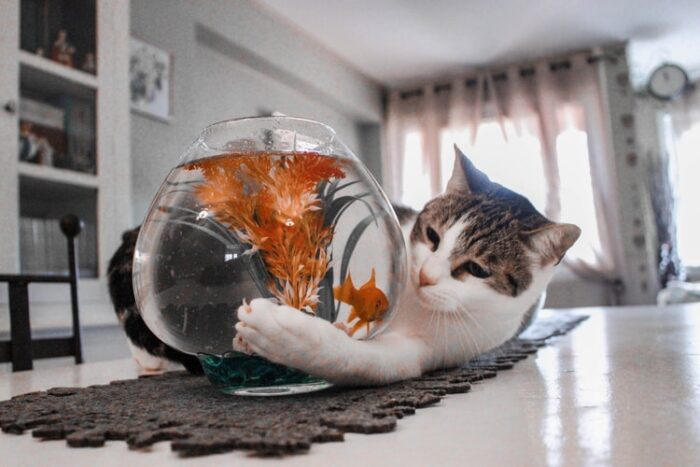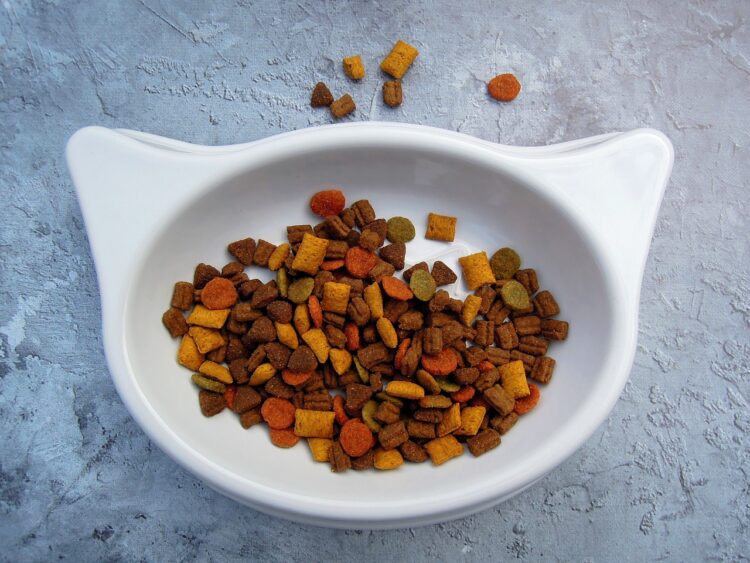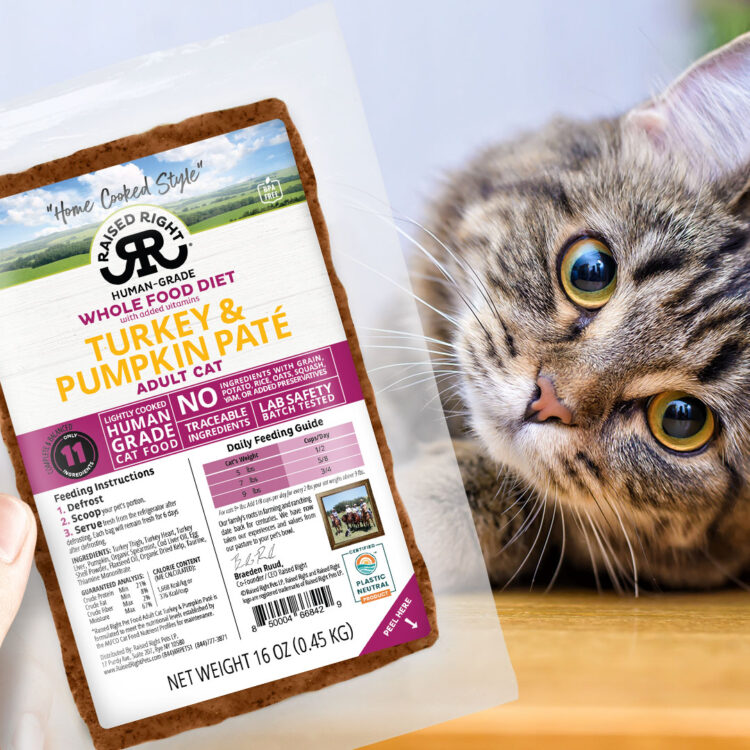
Fish is not a natural part of a cat’s diet, and yet, pet food manufacturers offer a large variety of fish-based foods, leading cat parents to think they’re providing an appropriate meal for their feline charges. And a lot of cats love fish. But while it’s tempting to indulge your feline’s palate, fish is not good for your cat’s health and can even be harmful.
A history of cats and fish
Cats have a long history of serving as crew members on fishing vessels, going all the way back to ancient Egypt, when fishermen took cats on boats with them to control rodent infestations. It is likely that fishermen tossed fish to the cats, giving the species a first taste of it.
While fish is not a natural prey for cats, there is one feline species that thrives on a diet of fish: the Asian Fishing Cat. Native to Southern Asia, these cats have partially webbed front toes, and their claws protrude slightly even when retracted. This facilitates the capture of prey, especially while underwater.
Fish is an allergen for many cats
Fish is one of the top three allergens for cats; the other two are beef and dairy. Come to think of it, beef and dairy aren’t part of a cat’s natural diet, either.
Mercury concentrations above safe levels
A 2016 study at the University of Nevada, Reno measured mercury levels in over 100 cat and dog foods on the market. The results showed that some of the pet foods had levels above what is considered “safe” for other animals. This was especially the case for formulas containing fish. For small mammals, 70 ng/g per day is considered “safe,” so the researchers considered the 100 ng/g to be a “reasonable level of concern” in dog and cat food. The researchers found that cat foods tend to have more mercury than dog food. Mercury concentrations in the tested brands ranged from 1 ng/g to 604 ng/g.
The higher a fish is on the food chain, the higher mercury levels and other toxins will be. This is especially true for predatory fish such as tuna, sharks, and swordfish. These fish eat smaller contaminated fish, thus increasing their own toxin load.
Other toxins and contaminants
Fish are also contaminated with industrial toxins such as PCB’s (polychlorinated biphenyls,) dioxins, and pesticides. These toxins are absorbed by even the smallest ocean plants and animals. When fish consume these contaminated plants and prey, the toxins accumulate and become more concentrated in the bodies of bigger fish.
High incidence of hyperthyroidism
There may be a link between the high incidence of hyperthyroidism in cats and fish based foods. A 2016 study that evaluated feline blood samples and cat food found that the type of polychlorinated biphenyls (PCBs) and polybrominated diphenyl ethers (PBDEs) derivatives found in the cat food and cat blood came from “marine organisms.”
Urinary tract and kidney problems
The fish used in canned pet foods is generally either whole fish or by-products from fish that can’t be used for human consumption, which means it may contain guts, feces, and bones. All of these are high in phosphorus and magnesium and can present problems for cats, especially those with kidney or urinary tract disease. In some cases, sensitive cats can develop cystitis and even life-threatening urinary blockages if they eat any fish at all.
Cats can become addicted to fish based foods
Cats have a tendency to become habituated to a certain type of food. This is actually part of their survival instinct. In the wild, the mother cat shows her kittens what’s safe to eat and what’s not, and cats tend to be reluctant to try new things later in life. Due to its high flavor profile, fish can be especially addictive.
What types of fish are used in cat food?
The primary fish used in cat food are salmon, tuna, and tilefish (identified on labels as ocean whitefish). Each comes with its own set of problems.
Salmon
Most salmon used in commercial cat food is farm-raised, not fresh caught. Fish are kept in overcrowded pens in coastal water fish farms. These waters are often polluted with PCB’s, pesticides and other contaminants. These fish are also fed antibiotics to limit the spread of disease, and dyes to make their flesh “salmon-colored”.
Tuna
Tuna are predatory fish, which means they often accumulate higher levels of heavy metals (including mercury) as well as PCBs, pesticides, and other toxins from the smaller fish they eat. Mercury levels in tuna are such a big concern that the FDA recommends only one serving of albacore tuna per week for humans. Additionally, tuna is highly addictive to cats. Cats fed tuna on a regular basis may refuse to eat anything else.
Tilefish (Ocean Whitefish)
Tilefish, usually labeled as Ocean Whitefish, are among the most contaminated fish. They are so toxic that the FDA advises women of child-bearing age and young children to avoid them entirely.
How to safely feed fish
Ideally, you should avoid fish-based foods altogether. If you must feed fish, use fish based foods sparingly as an occasional treat.
Photo by Hannah Reding on Unsplash








A question but not about fish, is pork bad for cats? Don’t remember ever seeing pork cat food. I don’t eat pork so mine won’t be getting any, just curious
Pork isn’t bad for cats, and can actually be a good choice for cats with allergies to other proteins, because it’s not commonly used in commercial cat food.
What about wild caught fish? I have been feeding a couple of foods from Open Farms, not b/c I want to, but b/c 2 of our cats just won’t transition to wet/raw. One did, but for about a month and then he turned his nose up at EVERYTHING we gave him and he wasn’t eating. I was unfortunately forced to give him the dry food b/c he hadn’t eaten for about a day 1/2. ugh! I didn’t know it had ANY fish in it. I didn’t look to be honest b/c it was highly recommended by a “cat” Youtube influencer that is well known…so I trusted…stupidly…
I think it’s fine as an occasional treat, but I wouldn’t feed anything fish-based exclusively. If you absolutely can’t transition your hard-core dry food hold out to wet wood, maybe try the Clean Protein chicken formula dry food. It’s higher in carbs than most other dry foods.
Thank you very much I thought cat’s favorite food is fish so I used to feed cat fish all the time but I didn’t know that fish is not good for cat’s health Thanks for this information.
I read that it’s the protein in fish that cats may be sensitive to. So, as long as the fish oil has no protein in it, which it should be just fat, some cat might do ok with it. Hard to trust a lot of pet food manufacturers to tell you the honest truth of the purity of their ingredients.
My cat Bella is very allergic to ANY KIND of FISH. I almost lost her when she was little. Be carful if it just says Chicken or Turkey. You really need to look at all the ingredient’s because it may also say Tuna. I can get on Chewy and see what is all the ingredients in that can of Cat Food. My Bella is a Torti. I adopted her when she was about 6 months old. Someone hit her so hard in the Head and they also declawed her front feat. The group I adopted her from found her under a tree almost dead. When I went to this shelter they were getting ready to put her down because she was having trouble with her back legs. I told them I will take her. The Brain damage that was done to her she can’t jump up on anything, I have to put her up on my Bed, the wind sills and anything else. She has never fallen off anything I put on. You would not know she is Blind from someone hitting her in the head like that. When you see Bella she has white mittens on her front feet and white boots on her back feet also a white bib under her chin. Bella is now 9 years old.
I feed Tasha Chicken,Beef, Turkey and fish canned foods. I’d be surprised if they came out with Mouse flavored food. Yuk!!!
My breeder told me no fish, especially tuna. I know we feed “our cats” beef, but I wonder if that is suited for them. They would never catch a cow in the wild. I would see that some might snag a fresh water fish from a stream. Rabbits, small birds (chicken would be similar), squirrels, rodents. Never milk, or cheese. Eggs if they could raid a nest. But alas, we usually don’t go for the live food, in keeping with their nature of hunting. So they hunt toys in their cozy indoor environment. After having sick cats last summer, they no longer get cheese or gobs of whip cream. Tiniest amounts on rare occasions. It was deadly for my previous cat. I do feed them ground sirloin in the morning with vitamins, lysine with food at lunch, and vitamins with dinner in the evening. Finding the optimum health for booth cats. Seems I have finally found the sweet spot. None of our food. It doesn’t take long to add up if one isn’t careful.
I’ve been eating fishy food all my life. I’m now 17 and a half. The past 3 years TW has been trying to feed me more chicken and beef. Coincidentally, that’s when I became a level 2 CKD kitty. Since I’ve stayed level 2 for the past 2 years, the doctor has told TW to keep doing what she has been doing cos it’s been working. All my other blood work was perfect.
I assume oils, other than fish oil, are also good sources of omega 3’s – like sunflower oil, which I commonly see in cat food free of fish.
I’m also wondering about fish oil in cat food – quality? Better if the fish oil comes from smaller fish like sardines/anchovies. If fish oil is also eliminated from the food, what would be the best source of omega 3’s for a cat?
Fish is probably the best source of omega 3’s for cats. Some manufacturers add flaxseed oil, but cats can’t covert that as efficiently as fish oil so the anti-inflammatory effects won’t be as strong. The same appears to be the case with sunflower oil.
My cat only eat fish. She will walk away and starve herself if she doesn’t have fish. My vet has told me it’s not good for them at all just as the article said. How can I continue feeding this cat if she is hooked on fish and won’t eat anything else?
Try gradually offering other choices, and try using meal toppers to entice your kitty to try different proteins.
This is a big surprise to me. I had no idea fish wasn’t really good for them. Thanks for this info.
My cats are eating a complete nutrition, raw food, mainly chicken, but I rotate toppers and treats, some with fish. One of my cat’s absolute favorite is sardines. Good info. Glad you shared it. Thanks.
I’m shocked as I have been feeding my cats major brands of cat food (fish and beef…they don’t like poultry) for over 40 years!